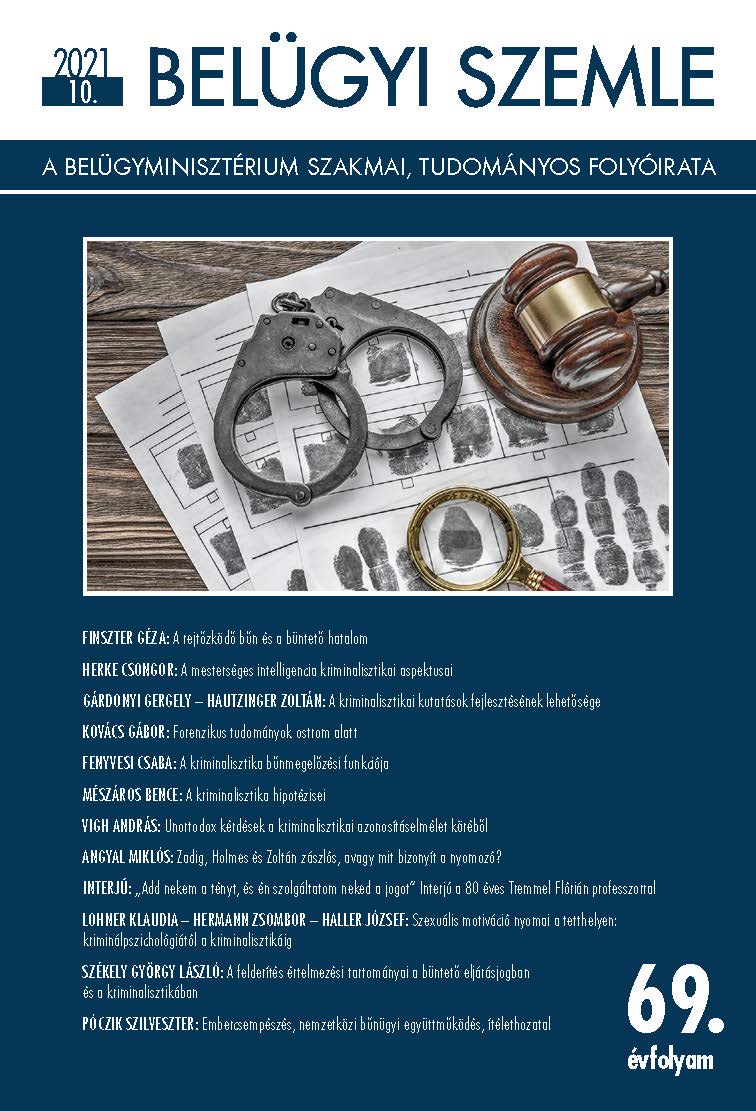Keywords
criminalistics
learning the past
criminal procedure
learning the past
criminal procedure
How to Cite
Hiding crime and punishing power. (2021). Academic Journal of Internal Affairs, 69(10), 1691-1707. https://doi.org/10.38146/BSZ.2021.10.1
Abstract
Learning the past will acquire a procedural significance when some real event of the past would trigger legal consequences. In addition to criminal cases this can be realized in civil litigation, in administrative procedures of the public power, but examples can also be taken from the field of labour law. As criminalistics represent the science of reconstructing a past event, an extension of it to all legal fields can be reasoned. However, such a turn does not have taken place, the discipline of investigation remained within the sphere of criminal sciences. The article examines the causes of that.
Downloads
Download data is not yet available.
Similar Articles
- Anna Kiss, The relationship between the investigative authority and the prosecution , Academic Journal of Internal Affairs: Vol. 71 No. 10 (2023)
- László György Székely, Some conceptual and legal questions of data gathering in criminal cases , Academic Journal of Internal Affairs: Vol. 72 No. 7 (2024)
- Valér Dános, Csaba Szabó, „Give me the fact and I serve you justice” , Academic Journal of Internal Affairs: Vol. 69 No. 10 (2021)
- Valér Dános, József Krenner, „We came here as servants and we leave as revolutionaries.” Interview with Professor Géza Finszter, Doctor of the Hungarian Academy of Sciences, on the occasion of his 80th birthday , Academic Journal of Internal Affairs: Vol. 73 No. 6 (2025)
- Csaba Fenyvesi, Dóra Rengel, Meaningful of a 'petty criminal case , Academic Journal of Internal Affairs: Vol. 73 No. 2 (2025)
- Balázs László, Detection and examination in a forgotten bill of Criminal Code , Academic Journal of Internal Affairs: Vol. 69 No. 7 (2021)
- Attila Sümegh, Gábor Bélai , Ronett Radvánszki, Bíborka Horváth, Aura Vörös, International Law Enforcement Observer XV. , Academic Journal of Internal Affairs: Vol. 72 No. 11 (2024)
- Dávid Petrétei, Criminalistics, police science, forensic sciences – reflections on the anniversary of the Hungarian Association of Police Science , Academic Journal of Internal Affairs: Vol. 72 No. 5 (2024)
- Csaba Szabó, Interview with Professor Csaba Fenyvesi, recipient of the Dr. Imre Kertész Award , Academic Journal of Internal Affairs: Vol. 73 No. 8 (2025)
- Dávid Petrétei, Theoretical Issues of the Trace and Pattern Evidences in the 21th Century , Academic Journal of Internal Affairs: Vol. 70 No. 5 (2022)
You may also start an advanced similarity search for this article.
Most read articles by the same author(s)
- Géza Finszter, László Korinek, István Szikinger is 70 years old , Academic Journal of Internal Affairs: Vol. 70 No. 3 (2022)
- Géza Finszter, Legal basis for the use of covert means , Academic Journal of Internal Affairs: Vol. 72 No. 6 (2024)
- Géza Finszter, Complementary policing , Academic Journal of Internal Affairs: Vol. 71 No. 1 (2023)
- Géza Finszter, Legal basis for the use of covert means , Academic Journal of Internal Affairs: Vol. 72 No. 6 (2024)
- Géza Finszter, László Korinek, Facts are stubborn things … The worse for the facts?! , Academic Journal of Internal Affairs: Vol. 69 No. 4 (2021)
- Géza Finszter, Training police leadership , Academic Journal of Internal Affairs: Vol. 61 No. 1 (2013)
- Géza Finszter, László Korinek, Tracing the footsteps of the lost suspicion , Academic Journal of Internal Affairs: Vol. 66 No. 3 (2018)
- Géza Finszter, László Korinek, An interview with Interior Minister Sándor Pintér , Academic Journal of Internal Affairs: Vol. 59 No. 9 (2011)
- Géza Finszter, Tibor Ibolya: Studies in the history of criminology , Academic Journal of Internal Affairs: Vol. 63 No. 10 (2015)
- Géza Finszter, Tibor Király (1920–2021) , Academic Journal of Internal Affairs: Vol. 70 No. 2 (2022)
